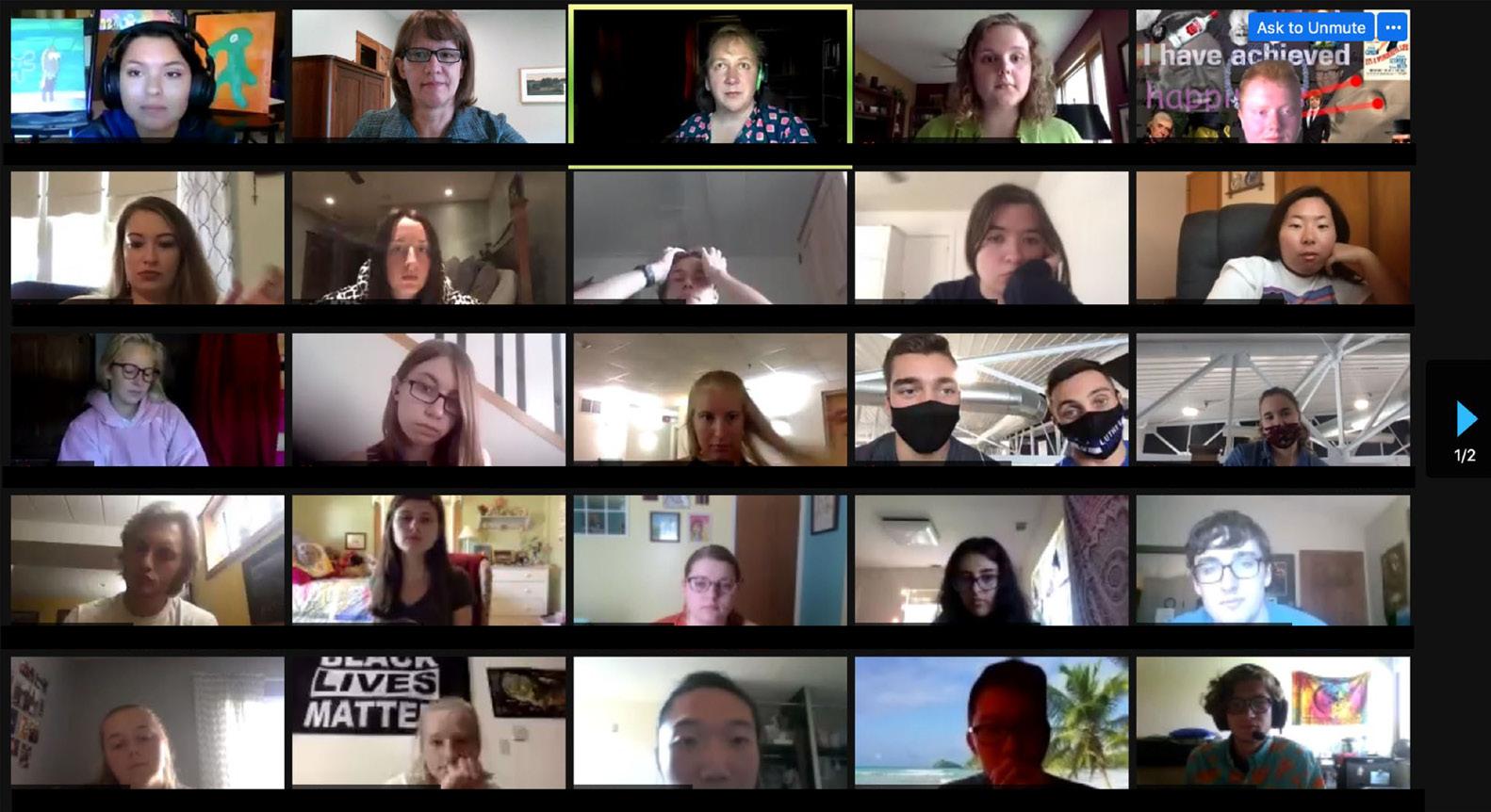
9 minute read
Building Happiness on Purpose: Teaching Paideia 450 Rebecca Sullivan
from Agora Fall 2020
Building Happiness on Purpose: Teaching Paideia 450
by REBECCA SULLIVAN, Associate Professor In Paideia
Writing my sabbatical proposal in 2019 in a context of relative normalcy, I proposed research that would lead to the development of a Paideia 450 course on happiness. Drawing from my research and teaching on the topic of vocation, the arc of the course would be toward the satisfaction that comes from a life of purpose. Like my previous Paideia 450, “Here on Earth,” this new course would be co-taught with my colleague from the Nursing Department, Janna Edrington. Now, as we step through the disruptions brought on by a pandemic, I suspect that I should have developed a course on resilience. Nevertheless, I think that the outcome of my sabbatical served students well in the September 2020 Paideia 450 course: “The Search for Happiness” because Covid-19 punctuated the ethos of the course: the quest never was for happiness, but for meaning. My sometimes unwieldy sabbatical project has primarily involved designing an interdisciplinary course that uses ethical reflection and intensive writing to explore the possibilities of a purposedriven and meaningful life. While the fields of philosophy and psychology have strongly influenced the study of happiness, American Studies also examines how media, advertising, and popular culture reflect a “happiness imperative” that pervades our national identity. By the end of World War I, as mechanization promised a better future, the search for happiness was amplified. In Happiness in America: A Cultural History, Lawrence Samuel documents the growing interest in the science of psychology during the 1920s and a trend in publishing books about life satisfaction. At mid-century, with the sacrifices of the Great Depression and World Wars in the past, consumer capitalism promised to be the way to achieve happiness. In a critique of this trend, socialist Erich Fromm observed, “Consumption was a means to an end, that of happiness. It now has become an aim in itself” (The Sane Society, 1955). Yet as consumer trends continue into the twenty-first century, broader marketing of luxury goods and the constant gaze of social media have only served to increase dissatisfaction. Paradoxically, in a culture that celebrates personal satisfaction, rising levels of anxiety and depression indicate a decline in wellbeing. The 2020 World Happiness Report demonstrates this ongoing decline of happiness in America, as the U.S. dropped to number 18 in the global ranking (from a peak of 11 in 2012, the first year that the United Nations Sustainable Development Network released its annual happiness report). It is interesting to note that Finland is again at the top of the list, followed by the other Scandinavian countries—suggesting that the Nordic values of social connection and solidarity contribute to well-being. While a desire for happiness isn’t unique to any one culture, the national identity of the United States does present the problem of an allusion to happiness in our founding documents. Although the Declaration of Independence was thoroughly edited by the Second Continental Congress in June 1776, Jefferson’s language about the fundamental rights, “life, liberty and the pursuit of happiness” was left unchanged. Jefferson himself attributed the authority of the Declaration to “the harmonizing sentiments of the day,” influenced by “elementary books of public right” by John Locke, Aristotle, and Cicero. For Aristotle, and arguably for Jefferson, the Greek word for happiness—eudaimonia—evoked not only self-actualization but also engaging one’s talents in civic concerns (although neither Aristotle nor JefRebecca Sullivan
IMAGES COURTESY OF THE AUTHOR
ferson was inclusive in their concept of civic participation). In the Nicomachean Ethics, Aristotle wrote, “The happy man lives well and does well; for we have practically defined happiness as a sort of good life and good action.” In a similar vein, Jefferson was also strongly influenced by the Scottish Enlightenment thinker Francis Hutcheson. Jefferson’s letters reflect Hutcheson’s “moral sense” philosophy, almost word for word, when he writes “[Humans are] endowed with a sense of right and wrong . . . as much a part of [their] nature as the sense of hearing, seeing, feeling”; imbued with this moral sense, they take pleasure in acts of benevolence. Hutcheson’s model understood the interests of individuals to be tied to the interests of society as a whole. Such intellectual influences suggest that the phrase “the pursuit of happiness,” which has often been taken to promote personal gratification, may actually reflect traditions that emphasize the benefit of the common good. To trace this intellectual history, I doubled back to revisit Aristotle. To Aristotle, the single ultimate goal of life is happiness, which is realized through virtuous activity in accordance with reason. In Aristotle’s framework, where
everything is intended to fulfill the psychologist Martin Seligman’s foun- is the foundation of the Next Steps for function for which it exists, the highest dational work. For his book Authentic Sophomores which, since 2017, has emhuman function is rationality; and the Happiness, Seligman devised a “Values bodied Luther’s commitment to student development of this distinct human ca- in Action” inventory to measure human reflection and vocational discovery: “[to] pacity for reason leads to a good life. It strengths, which he argues is the first help students understand and articulate follows that human happiness involves step in recrafting your life to use your the value of the liberal arts and envision finding a purpose in order to realize abilities “in the service of something their own contributions to the common one’s capabilities. Not dissimilar to our much larger than you are.” In Seligman’s good.” My continued motivation for decurrent concept of vocation, Aristotle view, when you have work that draws veloping vocation-oriented courses is to promoted the pursuit of the occupation on your signature strengths, “and you sustain the study of vocation that began that best fits an individual’s aptitudes: see your work as contributing to the at Luther nearly twenty years ago. one that, with practice and advancing skill, would likely bring pleasure. Aristotle’s view of human virtue and excellence became an axis for my reading about happiness and purpose. Midway into my sabbatical year, I transitioned to studying current happiness theory by enrolling in the course “The Science of Well-Being.” Taught by Dr. Laurie Santos, this course is the most popular online course at Yale University greater good, you have a calling. Your job is transformed from a burdensome means into a gratification” (2002). This approach to life satisfaction, along with the concept of “flow”—which Mihaly Csikszentmihalyi defines as complete absorption in an activity that involves one’s creative abilities—revealed to me the strong connection between current happiness theory and vocational discernment. Students are eager to explore their potential contribution to the world. With some guidance, young adults welcome reflection on the callings that have been communicated to them by personal experiences and the voices of mentors. It has also been useful to collaborate with the Career Center to administer the CliftonStrengths Assessment inventory to students as they consider their talents. Discussion about vocation reinforces and it served me well as an introduc- In 2002, Luther College first received a the college’s mission of educating for tion to the field of positive psychology. Lilly grant for Sense of Vocation pro- “service for the common good.” For me After studying genetic influences, social gramming. That programming allowed as an instructor, it is a privilege to hear reference points, hedonic adaptation, me to lead a student retreat, develop the students explore their most authentic and the patterns of behavior that af- course “Here on Earth: Vocation in a selves, looking to discover the thing fect life satisfaction, the class practiced Sustainable Global Community,” and that they “can’t not do.” In the midst research-based strategies to explore the present at conferences sponsored by the of that exploration, students appreciate values of kind- the assurance ness, gratitude, that at any one social connec- time we each tion, savoring have multiple experience, vocations and meditation, that there are exercise, and many satisfyeven adequate ing paths to sleep. I spent fulfillment. Our many winter life direction is days read- not a decision ing about we make once the effects of and for all. This income and shared reflececonomic tion helps stusecurity, mate- dents to make rialism, social the conneccomparison, tion between marriage and their studies family, social Screenshot of students in the September 2020 Paideia 450 class: “The Search for Happiness” and valuable relationships, real-world apmental and physical health, and spiritu- Network for Vocation in Undergradu- plications, which is one of the ideals of ality on life satisfaction. I’ve since used ate Education. I served on the Guiding a liberal arts education. In the words of what I learned to develop experiential Coalition of Luther’s Career Center and the Association of American Colleges student activities that explore how these participated in a “learning community” & Universities (AAC&U), “A liberal factors influence subjective well-being. that met in 2016 to reflect on vocation education helps students develop a sense Immersed in this research, I began to realize the goals of my sabbatical plan in and the liberal arts. These initiatives supported the conceptualization of the four-year planning and reflection that of social responsibility as well as strong and transferable intellectual and practical skills such as communication, ana-

lytical and problem-solving skills, and a demonstrated ability to apply knowledge and skills in real-world settings.” Vocation programming and course work is embedded in that conception of liberal education. In my experience, a Paideia 450 course is an ideal vehicle for juniors and seniors to reflect on real-world questions. Since 1978, the Luther curriculum has included this team-taught, interdisciplinary course that studies “an ethical issue that confronts us in our lives as learners and citizens.” Paideia 450s teach approaches to moral reasoning—guiding students to think about how to ask ethical questions—instead of teaching a particular moral framework. Students in these courses are asked to grapple with the tensions between abstract principles and real-life choices, or to examine how values guide the formation of specific policies. They prepare for debates and roundtable discussions, participate in case studies and scenarios, and write ethical assessments—balancing scholarly writings with personal experience— to work to resolve conflicting values. In these ways, the Paideia 450 experience reflects the energy of integrative learning at Luther College. A recent collection of case studies published by the AAC&U celebrated this common capstone experience, citing the way that “Paideia 450 prepares students to work with ‘unscripted questions,’ to address complex societal problems—problems where the right answer is unknown—in their personal lives, communities, and future workplaces” (Rising to the LEAP Challenge: Case Studies of Integrative Pathways to Student Signature Work, 2017). As a Paideia 450, “The Search for Happiness” asks students to weigh well-being with the competing interests of the “American dream,” working with unscripted questions as they look toward the future. When I teach about vocation, one of my favorite readings is an article by Kathryn Kleinhans, former professor of religion at Wartburg College and now dean of Trinity Lutheran Seminary at Capital University in Columbus, Ohio. In her Lutheran theology, where good works follow from faith, Kleinhans reminds us that Christian confidence is not found in measuring up or in pleasing God. “We are justified by faith rather than by ‘getting it right’” (“The Work of a Christian: Vocation in Lutheran Perspective,” 2005). We can’t be everything, but our baptism makes us free to act—to do something. This releases Christian students from the demand to somehow find the one unique and perfect purpose for their lives. Instead, it gives them (and me!) the freedom to pursue a life of meaning in any and every circumstance, even in the midst of a pandemic. Hopefully, this freedom extends itself to tackling sabbatical research beyond my area of expertise. With gratitude for the support of the college and all that I learn in my shared work with colleagues, I look back on a year filled with a sense of purpose.










